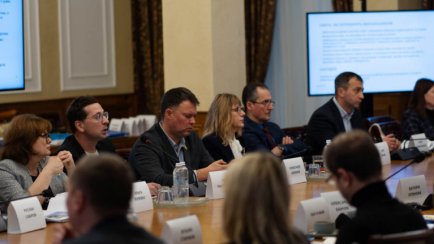Contact center of the Ukrainian Judiciary 044 207-35-46

Introducing specialisation of judges in cases involving children can demonstrate to international partners how Ukraine is implementing international standards on its way to joining the European Union. This was stated by Pavlo Parkhomenko, judge of the Civil Cassation Court of the Supreme Court, who presented a pilot project to introduce specialisation of judges in family and children's cases at a meeting of the Inter-Agency Coordination Council on Juvenile Justice. The meeting was also attended by Olha Buleiko, judge of the Grand Chamber of the Supreme Court, Iryna Falovska, Secretary of the Third Chamber of the Civil Cassation Court of the Supreme Court, Yevhen Synelnykov and Hanna Kolomiets, judges of the Civil Cassation Court of the Supreme Court.
Pavlo Parkhomenko noted that the Inter-Agency Coordination Council on Juvenile Justice (IACC) has already done a lot in the field of criminal justice, while thanks to international partners and stakeholders, the field of civil justice is also not left out of its attention.
The speaker emphasised that in the context of a full-scale war, cases involving children's interests have become even more important. The number of such cases is growing, and family disputes are one of the most complex categories of cases.
According to him, attention should be paid to the following aspects:
This should result in the strengthening of child-friendly justice based on international standards to which Ukraine has committed itself.

The judge noted that the CivCC of the Supreme Court co-organised a pilot project to introduce the specialisation of judges in family and children cases(http://surl.li/ymqifa). Also, at the joint initiative of the CivCC of the SC and the IACC, with the support of the United Nations Children's Fund (UNICEF) in Ukraine and the NGO Volunteer, a seminar was held at the Court on 28 November 2024 to launch the pilot project(http://surl.li/xnliwq).
Later, the project participants signed a memorandum of cooperation (three of the 11 participating courts are expected to sign the document in the near future). Work is ongoing to determine the appropriate specialisation in the courts participating in the project, organise training for judges, etc.
Pavlo Parkhomenko noted that the project involves courts from different regions of Ukraine. He expressed high hopes that Ukraine's judicial system will become an example of how to successfully implement child-friendly justice projects. According to him, Ukraine has had a positive experience of introducing the specialisation of family and children's judges in first instance courts for some time. Therefore, after the successful implementation of the pilot project, this experience can be extended to all courts in the country.
At the same time, the speaker said that the introduction of the specialisation of family and children's judges is the first step towards the introduction of family courts in Ukraine. This step is quite serious, but at the same time, it can serve as an example for foreign partners that Ukraine is implementing European standards on its way to joining the EU.

Among the expected outcomes of the project, Pavlo Parkhomenko named the following: fulfilment of Ukraine's commitments to develop child-friendly justice on the basis of appointing specialised judges for children and ensuring that such judges receive appropriate training; introducing specialisation of judges in family and children's cases as a way to respond promptly to changes in social relations and wartime challenges; encouraging close cooperation between different professionals and implementing a multidisciplinary approach in the best interests of the child; increasing the efficiency of judicial proceedings in cases concerning families and children, promptly making a lawful and fair decision in the best interests of the child; multiplying the best law enforcement practices and strengthening the unity of judicial practice in family and children's cases; creation of a modern holistic system of specialisation of judges in family and children's cases based on the principles of compulsory and continuous professional training; formation of a qualitatively new child-friendly justice system.
In addition, the speaker noted that the Supreme Court has already developed a positive practice of considering family disputes that takes into account the best interests of the child. In some cases, due to the lack of clear legislative regulation, the cassation court has formulated the relevant legal positions.
Presentation by Pavlo Parkhomenko - https://court.gov.ua/storage/portal/supreme/prezentacii_2024/Prezent_realiz_pil_proektu.pdf


